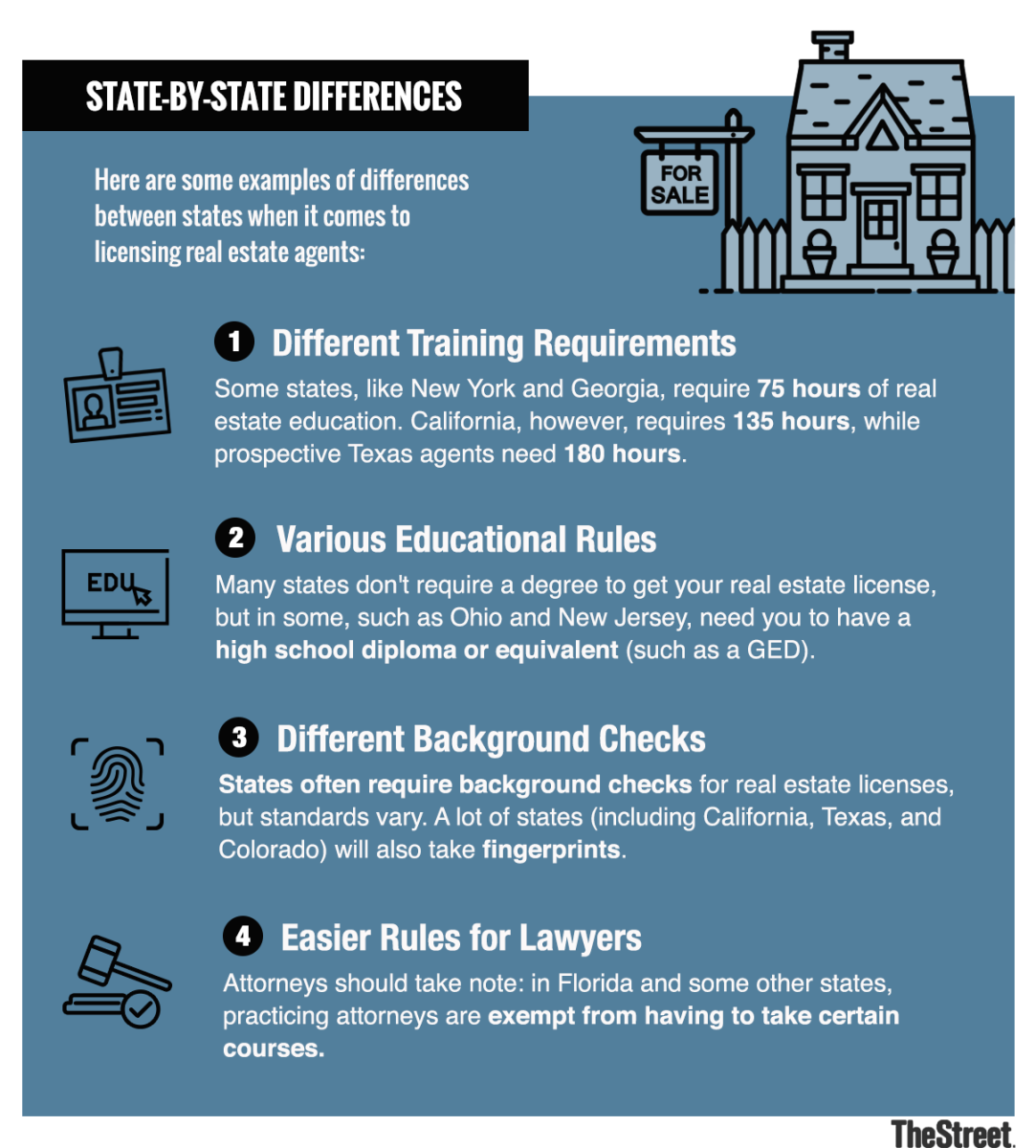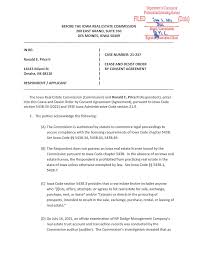
It can seem overwhelming to apply for a California Real Estate License. But the process is very simple. Pre-licensing education is required. This can be done in person or online. To pass the real property licensing exam, you will also need to pass it. The exam lasts three hours and includes 150 multiple-choice question. To obtain your license, the score must be at least 70%
Also, you'll need to go through the fingerprinting for background checks. The fingerprints are used for verification of your credentials and to ensure that you don't have any criminal records. The entire process could take as long as two weeks. If you have any criminal records, you will need a hearing request within 60 days. You can still fill out the application by using the state's eLicensing Portal. Finally, you must wait for your application processing before you can get your license.

Although it is possible to complete the entire licensure process in a matter of months, it is recommended that you complete it in at least a year. It's not difficult and you can find a realty school that will assist you in reaching your goals quicker. You can complete the entire course in less than five weeks.
It is crucial that you select the right brokerage if you want to become a real estate agent. You will be working with a broker, who is responsible to ensure that you comply with the industry rules. It is important to choose a company that has a similar work environment as you and has a common goal. Consider the fees. You will find that some brokers charge higher than others. The commission splits should be considered.
Online schools are a great way to get licensed in California as a real estate agent. Local Boards of Realtors offer many programs. Some schools will give you study materials or offer practice exams. You can also enroll in a live-online course or a two-day exam preparation course. The program will require you to pay a fee. You can expect to pay $99-275. Some of these schools will even cover the cost of re-taking the state's exam if you fail.
Not only will you need to go to a school of real estate, but you might also need to apply to become a sponsoring agent. This person will be able to help you with the process as well as provide support. You will typically work with a broker with years of industry experience. You should seek out recommendations from brokers about the best brokerages.

You can also choose to go through a real estate training program that provides you with a study guide and practice tests. There are many courses available. Some are even approved by the California Department of Real Estate.
FAQ
What are the chances of me getting a second mortgage.
Yes. However it is best to seek the advice of a professional to determine if you should apply. A second mortgage is typically used to consolidate existing debts or to fund home improvements.
How much money should I save before buying a house?
It depends on how long you plan to live there. Save now if the goal is to stay for at most five years. But, if your goal is to move within the next two-years, you don’t have to be too concerned.
Do I need flood insurance
Flood Insurance protects against damage caused by flooding. Flood insurance helps protect your belongings and your mortgage payments. Learn more about flood coverage here.
How many times can my mortgage be refinanced?
This is dependent on whether the mortgage broker or another lender you use to refinance. Refinances are usually allowed once every five years in both cases.
What is the average time it takes to get a mortgage approval?
It depends on many factors like credit score, income, type of loan, etc. Generally speaking, it takes around 30 days to get a mortgage approved.
Is it better for me to rent or buy?
Renting is often cheaper than buying property. However, renting is usually cheaper than purchasing a home. There are many benefits to buying a home. You will have greater control of your living arrangements.
Statistics
- The FHA sets its desirable debt-to-income ratio at 43%. (fortunebuilders.com)
- This seems to be a more popular trend as the U.S. Census Bureau reports the homeownership rate was around 65% last year. (fortunebuilders.com)
- Some experts hypothesize that rates will hit five percent by the second half of 2018, but there has been no official confirmation one way or the other. (fortunebuilders.com)
- Based on your credit scores and other financial details, your lender offers you a 3.5% interest rate on loan. (investopedia.com)
- This means that all of your housing-related expenses each month do not exceed 43% of your monthly income. (fortunebuilders.com)
External Links
How To
How to Manage a Property Rental
Renting your home can be a great way to make extra money, but there's a lot to think about before you start. We'll help you understand what to look for when renting out your home.
Here are the basics to help you start thinking about renting out a home.
-
What is the first thing I should do? Before you decide if you want to rent out your house, take a look at your finances. If you have debts, such as credit card bills or mortgage payments, you may not be able to afford to pay someone else to live in your home while you're away. It is also important to review your budget. If you don't have enough money for your monthly expenses (rental, utilities, and insurance), it may be worth looking into your options. It may not be worth it.
-
What is the cost of renting my house? It is possible to charge a higher price for renting your house if you consider many factors. These include things like location, size, features, condition, and even the season. Keep in mind that prices will vary depending upon where you live. So don't expect to find the same price everywhere. Rightmove has found that the average rent price for a London one-bedroom apartment is PS1,400 per mo. This means that if you rent out your entire home, you'd earn around PS2,800 a year. It's not bad but if your property is only let out part-time, it could be significantly lower.
-
Is this worth it? Although there are always risks involved in doing something new, if you can make extra money, why not? Be sure to fully understand what you are signing before you sign anything. Not only will you be spending more time away than your family, but you will also have to maintain the property, pay for repairs and keep it clean. Before signing up, be sure to carefully consider these factors.
-
Are there benefits? You now know the costs of renting out your house and feel confident in its value. Now, think about the benefits. There are plenty of reasons to rent out your home: you could use the money to pay off debt, invest in a holiday, save for a rainy day, or simply enjoy having a break from your everyday life. You will likely find it more enjoyable than working every day. If you plan ahead, rent could be your full-time job.
-
How do I find tenants After you have made the decision to rent your property out, you need to market it properly. Make sure to list your property online via websites such as Rightmove. Once potential tenants contact you, you'll need to arrange an interview. This will help you evaluate their suitability as well as ensure that they are financially secure enough to live in your home.
-
How do I ensure I am covered? If you fear that your home will be left empty, you need to ensure your home is protected against theft, damage, or fire. In order to protect your home, you will need to either insure it through your landlord or directly with an insured. Your landlord will usually require you to add them as additional insured, which means they'll cover damages caused to your property when you're present. If you are not registered with UK insurers or if your landlord lives abroad, however, this does not apply. In this case, you'll need to register with an international insurer.
-
It's easy to feel that you don't have the time or money to look for tenants. This is especially true if you work from home. You must put your best foot forward when advertising property. A professional-looking website is essential. You can also post ads online in local newspapers or magazines. It is also necessary to create a complete application form and give references. While some people prefer to handle everything themselves, others hire agents who can take care of most of the legwork. You'll need to be ready to answer questions during interviews.
-
What should I do after I have found my tenant? If there is a lease, you will need to inform the tenant about any changes such as moving dates. You can negotiate details such as the deposit and length of stay. While you might get paid when the tenancy is over, utilities are still a cost that must be paid.
-
How do I collect my rent? You will need to verify that your tenant has actually paid the rent when it comes time to collect it. If they haven't, remind them. After sending them a final statement, you can deduct any outstanding rent payments. If you're struggling to get hold of your tenant, you can always call the police. They will not normally expel someone unless there has been a breach of contract. However, they can issue warrants if necessary.
-
How can I avoid potential problems? Although renting your home is a lucrative venture, it is also important to be safe. Ensure you install smoke alarms and carbon monoxide detectors and consider installing security cameras. Check with your neighbors to make sure that you are allowed to leave your property open at night. Also ensure that you have sufficient insurance. You should never allow strangers into your home, no matter how they claim to be moving in.